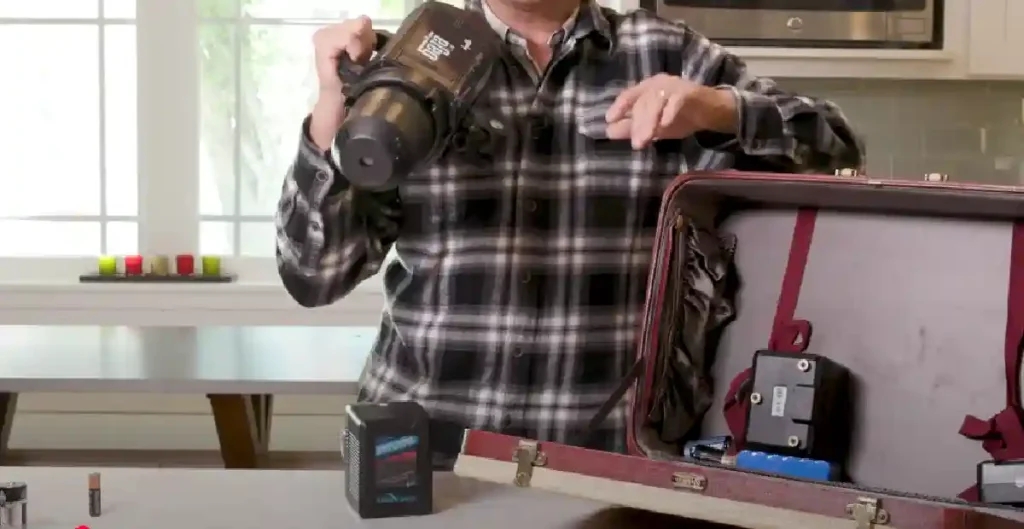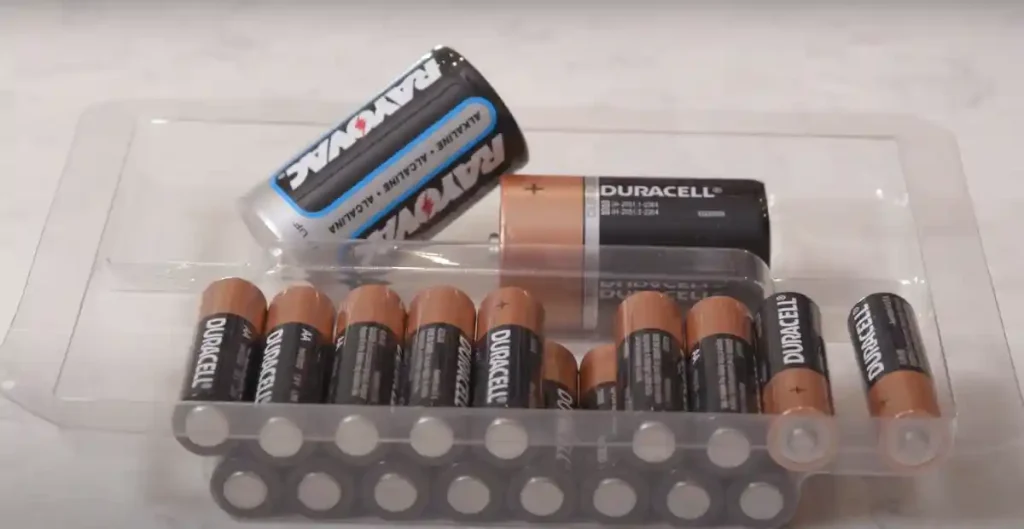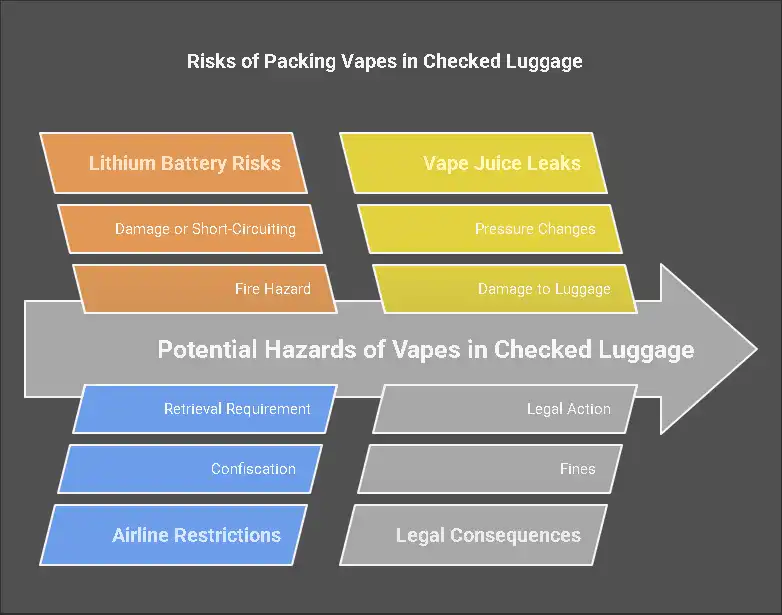What Happens If You Have a Lithium Battery in Checked Luggage: Lithium batteries in checked luggage can overheat and pose a fire risk. Airlines generally require these batteries in carry-on bags.
Transporting lithium batteries in checked luggage can be Hazardous due to their potential to overheat as well as cause fires. Airlines enforce strict regulations to mitigate these risks, often needing passengers to carry lithium batteries in their carry-on luggage instead. This policy confirms that any issues with the batteries can be addressed promptly by flight attendants.
Adhering to these guidelines helps maintain safety standards during flights. Always check specific airline policies regarding lithium batteries before traveling to confirm safety and compliance.
Table of Contents
ToggleAirline Policy On Lithium Batteries
Lithium batteries in checked luggage pose a significant danger. Airlines often prohibit them to prevent potential fire hazards. Always check airline policies to avoid problems.
Flying with lithium batteries can be a tricky business. Understanding airline policies helps avoid potential issues.
Restrictions On Lithium Batteries In Checked Luggage
Many airlines enforce strict rules. Here are some key restrictions:
- Maximum watt-hour (Wh) limit: Batteries must not exceed 100 Wh.
- Quantity limit: Only a few spare batteries are allowed.
- Proper packaging: Batteries must be in original packaging or isolated to prevent short circuits.
Reasons Behind Airline Policies
Airlines have these policies for essential safety reasons:
- Fire hazard: Lithium batteries can catch fire.
- Difficult to extinguish: Battery fires are not easy to control.
- Safety of passengers: These rules protect everyone on board.
Approved Lithium Batteries For Checked Luggage
Some batteries are permitted in checked luggage. These are the common types:
- Consumer electronics: Laptops and cameras normally have compliant batteries.
- Medical devices: Batteries for essential medical equipment are often permitted.
- Tools and equipment: Some power tools with batteries below the limit are approved.
Precautions To Take When Traveling

To ensure safety, follow these guidelines:
- Check airline rules: Each airline has particular policies.
- Use protective casings: Prevent terminals from touching.
- Inform airline staff: Let them know you have lithium batteries.
By knowing these airline policies, you can travel securely and avoid complications.
Frequently Asked Questions for What Happens If You Have a Lithium Battery in Checked Luggage
Can You Put Lithium Batteries In Checked Luggage?
No, you cannot put loose lithium batteries in checked luggage due to security concerns. Lithium batteries can pose a fire risk if damaged or exposed to high temperatures. The Federal Aviation Administration (FAA) and most airlines need lithium batteries to be packed in carry-on luggage.
Here are the general guidelines for lithium batteries in air travel:
- Lithium-ion batteries (like those used in laptops, cameras, or phones) with a watt-hour rating of less than 100 Wh are allowed in carry-on bags.
- Larger lithium-ion batteries (between 100 and 300 Wh) need airline approval, but they can still only be carried in the cabin.
- Spare batteries (uninstalled) must always go in carry-on luggage and should be protected from damage or short-circuiting.
For devices with installed batteries, like laptops, these are allowed in both carry-on and checked luggage, but it’s still recommended to put them in your carry-on bag for security.
Why Are Lithium Batteries Banned In Checked Luggage?

Lithium batteries are prohibited in checked luggage mainly due to the risk of fire. Here’s why:
- Fire Hazard : Lithium batteries can overheat, catch fire, or even explode under certain conditions. If a fire becomes in the cargo hold, it can be difficult to detect and extinguish early, especially at high altitudes.
- Thermal Runaway : Lithium batteries can experience a phenomenon acquainted as thermal runaway, where heat from a malfunctioning battery causes a chain reaction, igniting nearby cells. This can become if the battery is damaged, exposed to extreme temperatures, or experiences a short circuit.
- Cargo Hold Conditions : The conditions in a cargo hold are less controlled likened to the cabin. temperature and pressure changes, as well as possible rough handling, can increase the danger of battery damage.
- No Immediate Access : In the event of a fire in the cabin, flight attendants are able to respond quickly with fire suppression tools. In contrast, a fire in the cargo hold would be harder to address mid-flight.
These hazards have led aviation authorities, such as the FAA and IATA (International Air Transport Association), to forbid loose lithium batteries in checked luggage. Instead, they recommend keeping them in carry-on luggage where they can be monitored more easily.
What Happens If You Pack Lithium Batteries?
If you pack lithium batteries in your checked luggage, numerous things could happen depending on the position:
- Airport Security May Remove Them
Airport security scanners are designed to detect prohibited items, including lithium batteries. If your luggage is scanned and lithium batteries are found, they may be flagged as a safety hazard. Security personnel could open your bag, remove the batteries, and leave a notice explaining why.
- Your Luggage Could Be Delayed or Not Loaded
If the batteries are found during the baggage screening process, the airline might hold your suitcase to investigate the contents. This could cause delays, and in some cases, your suitcase might not be loaded onto the flight at all until the problem is resolved.
- Risk of Fire During the Flight
In the worst-case scenario, if lithium batteries are harmed, defective, or experience thermal runaway, they could overheat and catch fire in the cargo hold. Since this area of the plane is less accessible, a fire here is far more dangerous than in the cabin. Although aircraft cargo holds have fire suppression systems, these are not always sufficient to control a lithium battery burn.
- Fines or Penalties
In some regions, knowingly violating security regulations about transporting dangerous goods for example lithium batteries can result in fines or penalties. If it’s determined that packing lithium batteries in checked luggage was negligent or intentional travelers could face consequences from aviation authorities or the airline.
Safer Alternatives:
- Always pack lithium batteries in your carry-on luggage
- Cover battery terminals or place batteries in protective cases to prevent short circuits.
- If traveling with large lithium batteries (like for cameras or drones), check airline policies in advance for specific rules and limitations.
Are There Any Exceptions For Lithium Batteries?
Yes, there are a few specific and exceptions rules for lithium batteries when it comes to air travel. These exceptions normally depend on the type, size, and quantity of the battery. Here are the key exceptions:
- Installed Batteries in Devices
Small lithium-ion batteries (like those in smartphones, tablets, laptops, and cameras, etc.) that are installed in devices are particularly allowed in both checked and carry-on luggage. But, it’s still recommended to keep them in your carry-on for security.
Powering off the device is recommended before storing it in a checked suitcase to prevent accidental activation.
- Battery Size Limits
Lithium-ion batteries (less than 100 Wh) : These are permitted in both carry-on and checked luggage, as long as they are installed in devices. Spare batteries (not installed) must be in carry-on luggage only.
Lithium-ion batteries (100-300 Wh): These larger batteries, like those used in some power tools, medical devices, or large camera equipment, are permitted in carry-on luggage with airline approval. A maximum of two spare batteries of this size are allowed in carry-on luggage, but they are not permitted in checked luggage.
- Lithium Metal Batteries
Lithium metal batteries (less than 2 grams of lithium) : These are common in watches, small medical devices, and other electronics. Like lithium-ion batteries, they are approved in both carry-on and checked luggage when installed in devices. Spare lithium metal batteries must be in carry-on luggage only.
Batteries with more than 2 grams of lithium are normally not approved without special airline approval.
- Medical Devices
Some medical devices (like portable oxygen concentrators or certain battery-powered medical equipment) may contain lithium batteries. Exceptions are often created for these devices, moreover travelers should contact the airline in advance and may require to carry documentation.
- Portable Chargers and Power Banks
Portable chargers and power banks (which contain lithium-ion batteries) are considered spare batteries and must be placed in carry-on suitcases only. They cannot be placed in checked luggage under any circumstances.
- UN Certified Batteries
Some professionally packed batteries (like those used in equipment shipped by companies) may be UN-certified for security. If properly packaged according to international guidelines, they may be approved as checked baggage, though this especially applies to commercial shipping rather than personal travel.
It’s always a good idea to check with your specific airline for their laws and get permission for larger or multiple batteries before you travel.
What happens if you put a vape in checked luggage?

We also explore about What Happens If You Have a Lithium Battery in Checked Luggage before, you can check above this article. If you put a vape in checked luggage, it can lead to numerous issues, primarily due to airline laws and safety concerns:
- Lithium Battery Risks:
Most vapes contain lithium-ion batteries, which pose a fire hazard if damaged or short-circuited. This is why airlines disallowed carrying vape devices with batteries in checked luggage. If a vape is in the cargo hold and the battery overheats or punctures, it could lead to a fire that’s difficult to control.
- Airline Restrictions:
Most airlines strictly need passengers to carry electronic devices like vapes, e-cigarettes, as well as other battery-powered devices in their carry-on luggage . If a vape is found in checked luggage during security screening, it could be confiscated, or the airline may ask you to retrieve it from your bag before departure.
- Vape Juice Leaks:
Changes in air pressure during flight can cause vape liquid to leak and expand. This could damage your luggage or the items inside. It’s recommended to carry vape devices and e-liquids in your hand luggage where pressure changes have less impact.
- Fines or Legal Action:
In some countries, bringing a vape in checked luggage without adhering to rules can result in fines or legal action, particularly in regions where vaping products are heavily regulated or banned.
For safety and to avoid complications, it’s always perfect to pack your vape device in your carry-on bag.
Conclusion
Finally, to know What Happens If You Have a Lithium Battery in Checked Luggage bringing lithium batteries in checked luggage poses significant hazards. Airlines have strict laws to prevent potential risks. Always check airline policies before packing. Consider carrying lithium batteries in your carry-on for security. By following these guidelines, you can confirm a safer and smoother travel experience.
Stay informed and travel responsibly.





